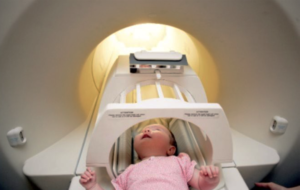What Are Brain Overgrowth Syndromes?
When a child's head is too big or grows too fast, this can have various causes. If the head is too big because the brain is too big or growing too fast, we call this megalencephaly. Usually the cause lies in a brain overgrowth syndrome.
What Causes Brain Overgrowth Syndromes?
Brain overgrowth syndromes often have a genetic cause. The condition develops when a certain protein does not work properly. The “recipe” for the production of the proteins is stored in our DNA. The DNA contains the genetic code for our hereditary characteristics, the genes. The DNA is packed in chromosomes. In brain overgrowth syndromes, the error is often in genes involved in the signaling pathway called the mTOR / AKT pathway. This signaling route becomes too active, which cause increased growth and or size of brain cells. This mutation may have arisen during fertilization, but also later during (brain) development.
Several brain overgrowth syndromes exist. In the ENCORE expertise center for brain overgrowth syndromes, we focus in particular on:
- M-CAP Syndrome (Megalencephaly capillary malformation syndrome): this is caused by a mutation in the PIK3CA gene
- MPPH Syndrome (Megalencephaly, polymicrogyria, polydactyly syndrome): this is caused by a mutation in the AKT3 gene, the CCND2 gene or the PIK3R2 gene
- Smith-Kingsmore Syndrome: This is caused by a mutation in the mTOR gene
- Megalencephaly due to a mutation in the genes: STRADA / LYK5, PP2A subunits (PPP2R5B, PPP2R5C, PPP2R5D) and RHEB
How Common Are Brain Overgrowth Syndromes?
These are very rare conditions. There are only a few new cases in the Netherlands every year. An exact number is not known.
Examination and diagnosis
 Children are typically referred to the neurogenetics clinic when the head circumference is above average. Often there is also a delayed development or other complaints. An MRI scan of the brain is then made, often under anesthesia. If this shows that there is megalencephaly (too large brain), genetic research is used to determine the cause.
Children are typically referred to the neurogenetics clinic when the head circumference is above average. Often there is also a delayed development or other complaints. An MRI scan of the brain is then made, often under anesthesia. If this shows that there is megalencephaly (too large brain), genetic research is used to determine the cause.
Brain overgrowth syndromes consultation hour
We provide children with brain overgrowth syndromes with structured follow-up within the ENCORE center of expertise to monitor foreseeable symptoms, to gain more insight into these rare conditions and to see if there are opportunities for innovative treatments. The consultation is on Mondays, several times a year, and involves the clinical geneticist, pediatric neurologist and pediatrician EAA. Separate is the possibility to conduct developmental and behavioral research in neuropsychology and child and adolescent psychiatry.
Children with brain overgrowth syndrome usually have an increased risk of epilepsy, for which treatment is started as needed. A ketogenic diet can also sometimes be a good option. Depending on the exact genetic cause, physical problems may occur, we keep a close eye on this and if necessary treatment is offered.
Recently, the doctors of the ENCORE center of expertise for cerebral overgrowth syndromes worked with a group of international colleagues on a 'guideline' for the follow-up and treatment of children with PIK3CA-related overgrowth syndrome (PROS). We will further develop the advice from this publication in the care path for children with PROS within the Sophia Children's Hospital. In this rare syndrome, how mild or severe the symptoms appear in each child varies greatly. We will therefore tailor-make treatment for each child, in consultation with parents.
Pediatric neurologist and coordinator: Dr. Marie-Claire de Wit
Clinical geneticist: Dr. Stefan Barakat
Pediatrics: Drs. Karen Bindels-de Heus and Dr. Danielle Veenma
Click here to go to the contact form or mail yourself to: kinderneurologie@erasmusmc.nl
In order to provide the best possible care to patients with a rare condition, it is essential that global knowledge about the condition is gathered. Nationwide, centers of expertise have been set up to stimulate care for rare disorders and to gather knowledge. For the formal recognition of an expertise center by the Ministry of Health, an important condition is that the expertise center gathers, analyzes and shares knowledge through publications. These can be publications in scientific journals, but also treatment guidelines for health care professionals or information brochures for patients or caregivers. We optimize care and research within ENCORE through standardized follow-up and close collaboration between doctors and researchers. That way, we can ultimately develop better treatments for rare conditions. You may therefore be asked to participate in research. Participation in research is always on a voluntary basis. The data obtained is stored and analyzed in an anonymous form. All research has been approved in advance by an ethics review committee.
To learn more about Brain Overgrowth Syndromes research at ENCORE, click here
There is no Dutch patient association for brain overgrowth syndromes.
For families with a child with M-CAP or MCM there is an international association, click here to go to the website. There is also an international association for parents of children with Smith-Kingsmore Syndrome, click here to go to the website.
